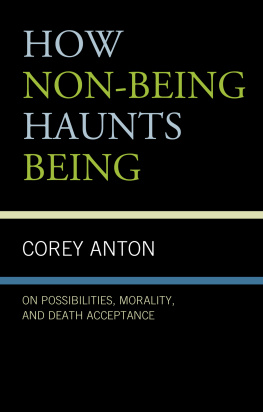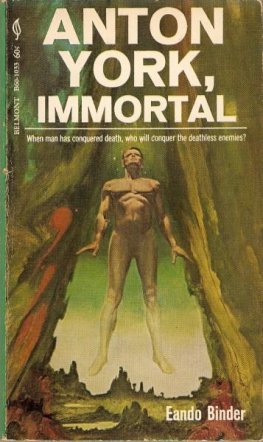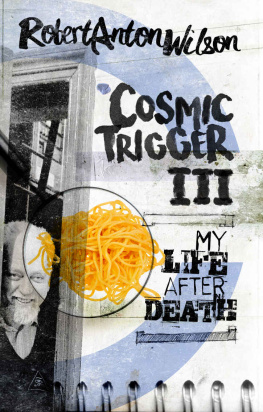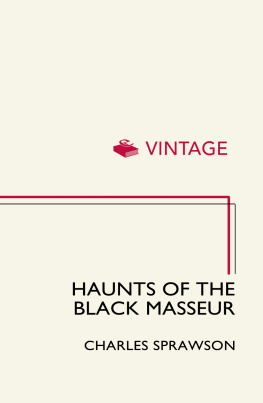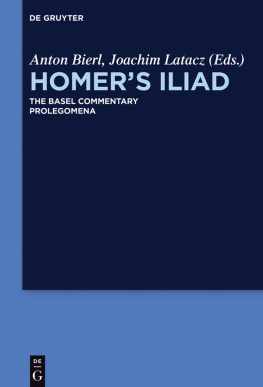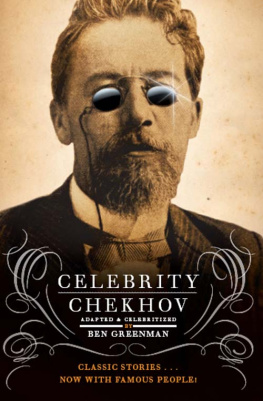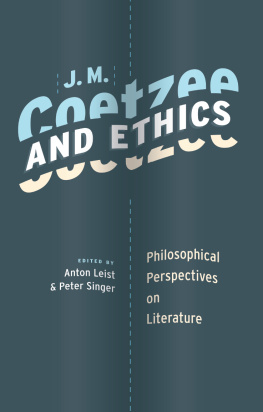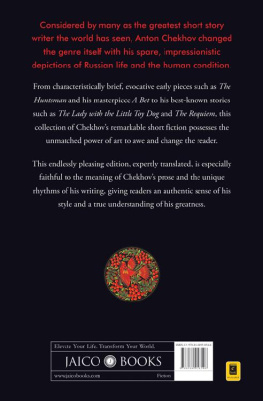How Non-being Haunts Being
The Fairleigh Dickinson University Press
Series in Communication Studies
General Editor:
Gary Radford, Department of Communication Studies, Fairleigh Dickinson University, Madison, New Jersey
The Fairleigh Dickinson University Press Series in Communication Studies publishes scholarly works in communication theory, practice, history, and culture.
Recent Publications in Communication Studies
Corey Anton, How Non-being Haunts Being: On Possibilities, Morality, and Death Acceptance (2020)
zm ok-Sayrak, Aesthetic Ecology of Communication Ethics: Existential Rootedness (2019)
Jennifer Biedendorf, Cosmopolitanism and the Development of the International Criminal Court: Non-Governmental Organizations Advocacy and Transnational Human Rights (2019)
Kate Dunsmore, Discourse of Reciprocity (2019)
Paul Matthew St. Pierre, Cinematography of Carl Theodor Dreyer: Performative Camerawork, Transgressing the Frame (2018)
Michelle Scollo and Trudy Milburn (eds.), Engaging and Transforming Global Communication through Cultural Discourse Analysis: A Tribute to Donal Carbaugh (2018)
Isaac E. Catt, Embodiment in the Semiotic Matrix: Communicology in Peirce, Dewey, Bateson, and Bourdieu (2017)
Craig T. Maier, Communicating Catholicism: Rhetoric, Ecclesial Leadership, and the Future of the American Roman Catholic Diocese (2016)
Paul Matthew St. Pierre, Cinematography in the Weimar Republic: Lola-Lola, Dirty Singles, and the Men Who Shot Them (2016)
Anastacia Kurylo and Tatyana Dumov (eds.), Social Networking: Redefining Communication in the Digital Age (2016)
Phil Rose, Radiohead and the Global Movement for Change: Pragmatism Not Idealism (2015)
Brent C. Sleasman, Creating Albert Camus: Foundations and Explorations in His Philosophy of Communication (2015)
Michael Warren Tumolo, Just Remembering, Rhetorics of Genocide Remembrance and Sociopolitical Judgment (2015)
Phil Rose, Roger Waters and Pink Floyd (2015)
Ronald C. Arnett and Pat Arneson (eds.), Philosophy of Communication Ethics: Alterity and the Other (2014)
Pat Arneson, Communicative Engagement and Social Liberation: Justice Will Be Made (2014)
On the Web at http://www.fdu.edu/fdupress
How Non-being Haunts Being
On Possibilities, Morality, and
Death Acceptance
Corey Anton
FAIRLEIGH DICKINSON UNIVERSITY PRESS
Vancouver Madison Teaneck Wroxton
Published by Fairleigh Dickinson University Press
Copublished by The Rowman & Littlefield Publishing Group, Inc.
4501 Forbes Boulevard, Suite 200, Lanham, Maryland 20706
www.rowman.com
6 Tinworth Street, London SE11 5AL, United Kingdom
Copyright 2021 by Corey Anton
All rights reserved. No part of this book may be reproduced in any form or by any electronic or mechanical means, including information storage and retrieval systems, without written permission from the publisher, except by a reviewer who may quote passages in a review.
Fairleigh Dickinson University Press gratefully acknowledges the support received for scholarly publishing from the Friends of FDU Press.
British Library Cataloguing in Publication Information Available
Library of Congress Cataloging-in-Publication Data
ISBN 9781683932840 (cloth : alk. paper)
ISBN 9781683932857 (electronic)

TM The paper used in this publication meets the minimum requirements of American National Standard for Information Sciences Permanence of Paper for Printed Library Materials, ANSI/NISO Z39.48-1992.
For:
Kiki, who understood
more than she could say
Acknowledgments
So many people need to be acknowledged and thanked. First and foremost, I need to thank Grand Valley State University for the kind sabbatical release from teaching duties during Winter 2019. As I did the bulk of the writing during that time, I need to express my deepest gratitude. Without such uninterrupted chunks of time, this book would not have come into existence. I also need to thank GVSUs Center for Scholarly and Creative Excellence and the School of Communications for their generosity in supporting this work. I would also like to thank some of my colleagues at Grand Valley, including Robert Mayberry, Maria Cimitile, Jonathan K. Hodge, Allen Whipps, Judy Whipps, Vandana Pednekar-Magal, Mark Pestana, Stephen C. Rowe, Ivo Soljan, Richard Joanisse, Avis Hewitt, Kathryn Remlinger, and Peter Zhang.
I must acknowledge several academic organizations. The Media Ecology Association (MEA), the National Communication Association, especially the Philosophy of Communication Division and Communication Ethics Division, and the Institute of General Semantics (IGS) have all provided me with space and time to present bits and pieces of these ideas in various locales over the past decade.
I need to thank Lance Strate, Thom Gencarelli, Ed Tywoniak, Paul Lippert, Phil Rose, Teresa Manzella, Dennis Cali, Stephanie Bennett, Paul Soukup, Barry D. Liss, Robert K. Logan, Michael Plugh, Jonathan Slater, and others of the MEA for helping me think about these ideas. I also want to thank and acknowledge Martin H. Levinson, Jacqueline Rudig, and Mary Lahman from the IGS.
I want to recognize and acknowledge a collection of many friends who have talked with me about the book in some form or other. I well know that a few of my friends not only disagree with various views expressed here and would hold counterpositions, but I need to acknowledge the many people who have helped me to think about these issues, often more than they knew. I want to thank Bryan Wehr, Phil Paradowski, Tom Koster, Matt Wass, Kim Helmers, Brian Esparsa, Lynn Brouwer, Robin Andreozzi, Valorie Putnam, Jamie Cross, Rayme Bracken, Brenda Millie Payne, Tom McCarthy, Ray Feenstra and Sue Feenstra, Jeremy Czarniak and Polly Czarniak, Toby Moleski, Brent Newville and Marge Newville, Mark Zuidema, Natalie Sydorenko, Laurel Humphreys, Stephen Matchett and Karen Matchett.
I need to express my deepest thanks and appreciation to Valerie V. Peterson for all of her support, encouragement, and detailed assistance in the preparation of this manuscript. She has been there with me through it all. The book, as a whole, has been improved significantly by her many useful suggestions.
For assistance during the final stages I wish to thank and acknowledge Chad Hansen, John Dowd, Jermaine Martinez, Eric S. Jenkins, Leon Cerdena, Joseph Gemin, and Elizabeth Ketcham Kheder.
Finally I need to thank the Josiah Macy Jr. Foundation for their kind permission to reprint the Diagram for discussion purposes referred to as onionskin, taken from Batesons 1955 lecture/group discussion, published in 1956.
Preface
This book attempts to open some room for spirituality amidst thoroughgoing death acceptance. Too commonly, if people say that they do not believe in life after death but that they are not atheists, many Christians (and other religious folks, too) seem confused and doubt that such a position is possible. Or, if it is seen as possible, it is accused of sliding inevitably into nihilism. This work show the contrary: accepting death, and thereby that non-being haunts being, in no way necessitates nihilism. In fact, living a liepublically claiming to know what one privately doubts or even disbelievesis a subtler, more pervasive and dangerous nihilism in todays world. Nihilism does not come from honest inquiry, humility, and acceptance; rather, it comes from the failures invited by haughty self-importance, wishful thinking, and overdrawn expectations.

 TM The paper used in this publication meets the minimum requirements of American National Standard for Information Sciences Permanence of Paper for Printed Library Materials, ANSI/NISO Z39.48-1992.
TM The paper used in this publication meets the minimum requirements of American National Standard for Information Sciences Permanence of Paper for Printed Library Materials, ANSI/NISO Z39.48-1992.
